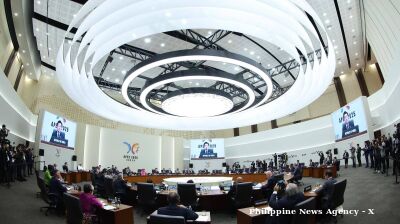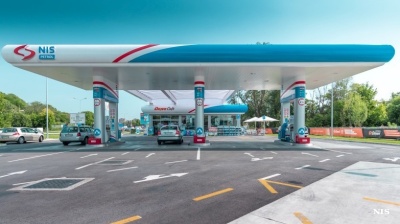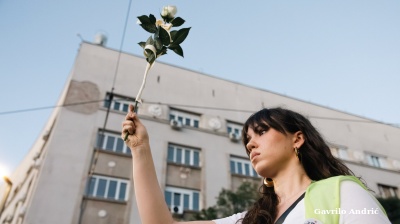145 members of the European Parliament have sent a letter to Serbian President Aleksandar Vucic and Prime Minister Ana Brnabic, urging them to reconsider the decision to cancel the EuroPride event due to take place in Belgrade in September.
Serbian President Aleksandar Vucic announced on August 27 that the international EuroPride parade had been cancelled. Vucic said the government had been under heavy pressure from right-wing groups and representatives of the Serbian Orthodox Church to cancel the parade, which would have been Europe’s largest Pride event.
The letter was initiated by the LBGTI Intergroup Bureau and MEP Marc Angel of the Socialists and Democrats (S&D), and signed by 145 MEPs, including six vice-presidents of the European Parliament, reported European Western Balkans.
Brnabic said on August 28 that the march could not be held safely in Serbia because of the need to focus on preventing violence in northern Kosovo from September 1.
At the weekend, there was a thousands-strong march in Belgrade against the event (even though it had already been cancelled). Protesters included right-wing and religious Serbs, and some carried Russian flags and posters of Russia's President Vladimir Putin.
However, the MEPs’ letter argued that while the European Parliament is aware of the security threat, banning the event is not the right solution.
“The situation of anti-LGBTIQ counter-protests, which are often violent, is unfortunately not new to Prides and therefore the police response should be swift, efficient and sufficient. Should there be a need, more police should be deployed to ensure the Pride march and surrounding events can effectively take place,” said the letter, as quoted by European Western Balkans.
On August 31, US Secretary of State Antony Blinken added his voice to the calls from European politicians in urging Belgrade to reconsider.
“Freedoms of peaceful assembly and expression are essential components of a healthy democracy. We urge Serbia to renew its commitment to hosting EuroPride 2022. LGBTQI+ rights are human rights,” Blinken wrote on Twitter.
Earlier, President Aleksandar Vucic described Serbia as the stage for a proxy war between East and West, speaking to Reuters on August 29.
Earlier, President Aleksandar Vucic described Serbia as the stage for a proxy war between East and West, speaking to Reuters on August 29.
Commenting on the protest, Vucic told the newswire: "I cannot say that it was a proxy attack, because there were many ordinary people there ... but whether there is a proxy conflict in Serbia ... there is one, no doubt about that, East and West.”
Vucic has long pursued a ‘four pillar’ foreign policy, aiming at good relations with the EU, the US, Russia and China. However, this became difficult after the invasion of Ukraine, and Serbia has been under pressure to fall into line with EU foreign policy and impose sanctions, a step already taken by other candidate countries in the Western Balkans.
As reported by bne IntelliNews, LGBT and alternative lifestyles in general remain a very difficult subject for the people of the whole former socialist bloc, where a large majority of citizens retain conservative values rooted in the Orthodox Church or Islam. Homophobia and even random violent attacks on gays are widespread and common. Discrimination is institutional and few countries have adopted anti-hate speech laws or legislation to support same-sex partnerships.
The EU candidate countries in the Western Balkans have made more progress on reforms positively affecting LGBTI people than the EU members from the region. Montenegro has the best legal and policy environment for LGBTI people in the emerging Europe region, according to the Rainbow Europe Map and Index from International Lesbian, Gay, Bisexual, Trans and Intersex Association in Europe (ILGA-Europe). Montenegro was the top ranked country from the emerging Europe region and is only outperformed by 10 West European countries (Malta, Belgium and Luxembourg top the list).
Serbia also stands out as having the first openly gay prime minister in the region, Ana Brnabic, who has just been nominated to serve a new term.
At the time, the only other openly gay ministers in the region was Latvian foreign minister Edgars Rinkevics, who came out on Twitter in 2014 with the hashtag #Proudtobegay. Even the ministers in Latvia’s progressive Baltic neighbours reacted by saying it was still “too early” for gay ministers in their countries.
While several Pride marches have been held in Belgrade, the events always arouse controversy. The march in September 2018, for example, was peaceful but took place amid an extremely heavy police presence, with around 5,000 police on the streets according to media estimates, and helicopters flying overhead.
Previously, Serbia failed to hold gay parades for several years after the first two events ended in violent clashes. There was a 10-year hiatus after the first attempt in 2001 ended in brutal violence on streets. There were also clashes in 2010 when around 6,000 right-wing extremists and hooligans, mainly football fans, caused damage in the town by burning and vandalising cars, and breaking windows and other public property. Over 140 people were injured, including many policemen.
For the next three years the government banned the march, which it assessed as a “high level risk” event. However, Pride resumed in 2014.
News

South Korea opens APEC summit focusing on connectivity and growth
South Korean President Lee Jae Myung chaired the opening session of the Asia Pacific Economic Cooperation (APEC) Leaders’ Meeting on the morning of October 31 in Gyeongju, North Gyeongsang Province.

Serbia’s NIS posts 9-month net loss as US sanctions weigh on performance
NIS, majority-owned by Russia’s Gazprom Group, said it had operated in “extremely complex circumstances” after sanctions were announced by the US Treasury Department.

Nigeria's Heirs Energies' CFO on powering growth via sustainable, indigenous-led development
NewsBase speaks exclusively to Samuel O. Nwanze, Executive Director and Chief Financial Officer of Nigerian indigenous integrated oil and gas company Heirs Energies.

Brazil's Lula "horrified" as Rio police raid death toll reaches at least 130
Brazilian President Luiz Inácio Lula da Silva expressed shock at the fatalities from a massive police operation targeting Rio drug gangs that left scores dead, while residents and rights advocates accused authorities of summary executions.



